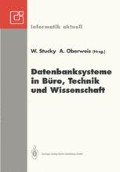Abstract
In the last decade, the emphasis in database research has shifted from the relational to semantic and object-oriented models. The latter are supposed to enable us to construct application domain descriptions that are more faithful to how humans conceive reality than what was previously possible. Although current OODB’s are superior to value-based models, nevertheless they are still restricted in their modeling power. To understand how to use them properly, and more importantly to know what to ask for in the next generation of systems, requires that we consider not only purely technical implementation-related issues, but also more abstract problems, such as: What are the distinctions, if any, between objects and values? What are the mechanisms for identification of objects? How are abstractions related to, and represented by objects? Answers to these and similar problems are important for the development of computational object-oriented models, hence dealing with them is in the realm of Computer Science, although they are also of general philosophical interest and have been considered in previous centuries by philosophers, such as Leibniz. These questions, with examples and motivation, are discussed in the paper.
Research partially supported by a grant from GIF — The German Israeli Foundation.
Access this chapter
Tax calculation will be finalised at checkout
Purchases are for personal use only
Preview
Unable to display preview. Download preview PDF.
References
S. Abiteboul and P.C. Kanellakis, Object identity as a query language primitive. Proc. ACM SIGMOD Int. Conf., Portland, Oregon, 1989, 1159–173.
M. Atkinson et al. The object-oriented database system manifesto, in 1st Int’l Conf. on Deductive and Object Oriented Databases. W. Kim, J-M. Nicolas, S. Nishio (eds), 1989, 370–395
F. Bancilhon Object-oriented database systems, Proc. 7th PODS, 1988, pp. 152–162.
C. Beeri. A Formal approach to object-oriented databases. Data and Knowledge Engineering 5,(1990), 353–382. A preliminary version in 1st Intl Conf. on Deductive and Object Oriented Databases. W. Kim, J-M. Nicolas, S. Nishio (eds), 1989, 370–395
C. Beeri and B. Thalheim, Can I see your identification, please? — Identification is well-founded in object-oriented databases, manuscript, Dec. 1992.
H.-D. Ehrich, G. Saake, and A. Sernadas, Concepts of object-orientation. Proc. 2nd Information System and KI Workshop, Ulm 1992.
J. Göers, and A, Heuer, Definition and application of metaclasses in an object-oriented database model, to appear Proc. DE conf. Vienna, April 1993.
T. Imilienski, S. Naqvi, and K.Vadaparty. Non-determinism in object-oriented databases for design and planning applications, Proc. ACM SIGMOD Conf. 1991.
T. Imilienski, S. Naqvi, and K.Vadaparty. Querying design and planning applications, Proc. 2nd DOOD Conf. Munchen, Dec. 1991, Springer LNCS, 525–543.
G. MacDonald Ross. Leibniz. Past Masters - Oxford, Univ. Press, 1984.
J. Richardson, and p. Schwarz. Aspects: extending objects to support multiple, independent roles, Proc. ACM SIGMOD Conf. 1991.
J. Richardson, and p. Schwarz. MDM: An object-oriented data model, Proc. 3rd DBPL Workshop,Greece, Aug. 1991, Morgan-Kaufmann, 86–95.
K.-D. Schewe, J.W. Schmidt, B. Thalheim, and I. Wetzel. Extensible safe object-oriented design of database applications. Preprint Computer Science Dept. 09–91, University Rostock, 1991.
K.-D. Schewe, J.W. Schmidt, and I. Wetzel, Identification, genericity and consistency in object-oriented databases. Proc. ICDT92,Berlin, Germany, Oct. 1992, Springer LNCS, pp. 341–356.
J. D. Ullman, A comparison between deductive and object-oriented database systems, Proc. 2nd DOOD Conf.,Munchen, Dec. 1991, Springer LNCS, pp. 263–278.
I. Wetzel, Hamburg Univ., private communication, 1992.
Author information
Authors and Affiliations
Editor information
Editors and Affiliations
Rights and permissions
Copyright information
© 1993 Springer-Verlag Berlin Heidelberg
About this paper
Cite this paper
Beeri, C. (1993). Some thoughts on the future evolution of object-oriented database concepts. In: Stucky, W., Oberweis, A. (eds) Datenbanksysteme in Büro, Technik und Wissenschaft. Informatik aktuell. Springer, Berlin, Heidelberg. https://doi.org/10.1007/978-3-642-86096-6_2
Download citation
DOI: https://doi.org/10.1007/978-3-642-86096-6_2
Publisher Name: Springer, Berlin, Heidelberg
Print ISBN: 978-3-540-56487-4
Online ISBN: 978-3-642-86096-6
eBook Packages: Springer Book Archive

